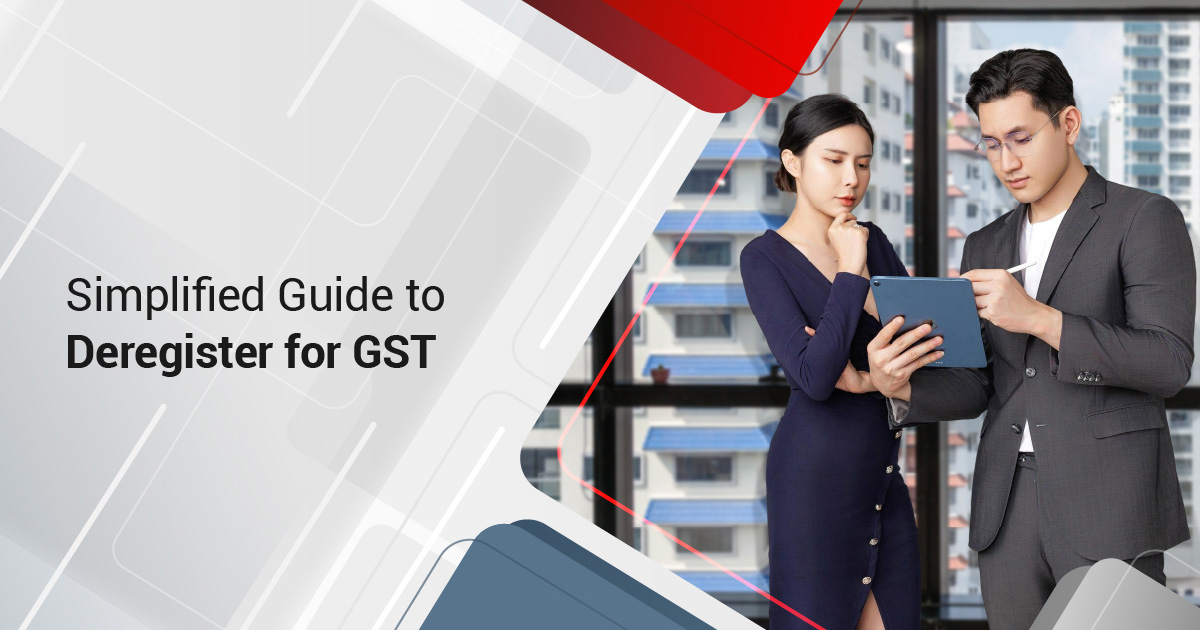In Singapore, registering for Goods and Services Tax (GST) is a significant milestone for many growing businesses, signaling their entry into a new phase of commercial activity. However, as business circumstances evolve, continuing to be GST-registered may no longer align with a company’s operational needs or financial strategy.
This is when understanding the process of GST deregistration becomes essential for maintaining compliance and optimising financial management. GST deregistration is the formal process of canceling a company’s GST registration with the Inland Revenue Authority of Singapore (IRAS).
This move means the business will no longer be required to charge GST on its sales, nor will it be able to claim input tax credits on its purchases. Companies typically consider this step when they cease operations entirely or when their annual taxable turnover falls below the S$1 million threshold required for mandatory registration.
While the prospect of reducing administrative burdens is appealing, the decision to deregister carries significant implications. It requires careful evaluation of your company’s financial position, adherence to strict IRAS guidelines, and a clear understanding of the final reporting obligations.
This guide provides a structured overview of the GST deregistration process, outlining the criteria, necessary steps, and key considerations to ensure a smooth and compliant transition.
Key Takeaways
- Understand that GST deregistration is the formal process of canceling your registration with IRAS, which means you can no longer charge GST or claim input tax credits.
- Identify the right time to deregister, such as when your business ceases operations or its annual taxable turnover falls below the S$1 million threshold.
- Evaluate the pros and cons, including reduced administrative burdens versus the loss of input tax claims and the need to account for GST on existing assets.
- Follow the correct procedure by submitting an online application via myTax Portal and filing a final GST return (GST F8) within the specified timeframe.
- Ensure compliance by accounting for GST on assets held at deregistration and maintaining all business records for at least five years.
What Does it Mean to Deregister for GST?

If charging GST no longer aligns with your business model or financial objectives, it may be time to consider canceling your GST registration. Knowing when to deregister is crucial, as it can significantly impact your financial management, competitive positioning, and compliance obligations.
In Singapore, deregistering for GST means that a business is no longer registered under the GST system and is no longer required to charge, collect, or file GST returns. This process is regulated by the Inland Revenue Authority of Singapore (IRAS) and can occur under specific circumstances.
A smooth transition often requires careful planning, particularly when managing input tax credits, and consulting with accounting experts can help ensure you navigate the process seamlessly.
Related Read: GST Return in Singapore: How to File Successfully
What is Compulsory Cancellation of GST Registration?
There are certain scenarios that make it compulsory to cancel GST registration. You must apply to cancel within 30 days. They are:
- When a business stops making taxable supplies and does not intend to make such supplies in the future
- When a business stops operating
- When a business is transferred as a whole to another person, whereby the buyer or transferee must then determine if they need to register for GST
- When the business entity has changed, such as from a limited liability partnership (LLP) to a general partnership, or from a sole proprietorship to a private limited company. You do not need to inform IRAS if your business has been amalgamated or if your sole proprietorship has been converted to a partnership or vice versa. IRAS will cancel your GST registration after receiving information from ACRA
What is Voluntary Cancellation of GST Registration?
You can apply to cancel your GST registration if you do not need to register. However, if you were previously registered on a voluntary basis, you must stay registered for at least 2 years before you can cancel it.
Benefits and Drawbacks of Voluntary Cancellation
| Benefits | Drawbacks |
|---|---|
| Reduced Administrative Burden: Businesses no longer need to file GST returns, maintain detailed GST records, or comply with GST reporting requirements, saving time and effort. | Loss of Input Tax Credits:b> Businesses can no longer claim input tax credits on purchases, which may increase overall costs, especially for those with significant expenses. |
| Lower Compliance Costs: Deregistration eliminates costs associated with GST compliance, such as hiring accountants or using software to manage GST filings. | Final GST Obligations: Deregistration requires filing a final GST return and accounting for GST on assets and inventory held at the time of deregistration, which could result in a one-time tax liability. |
| Improved Cash Flow: Businesses no longer need to charge GST on their sales, which can make their products or services more competitively priced, especially for customers who are not GST-registered. | Impact on Business Perception: Some clients or partners may view GST deregistration as a sign of reduced business activity or financial instability, potentially affecting credibility. |
| Simplified Financial Management: Without the need to track input and output taxes, businesses can streamline their accounting processes. | Limited Future Flexibility: If the business grows and exceeds the S$1 million threshold again, it will need to reapply for GST registration, which can be time-consuming. |
How to Cancel GST Registration in Singapore
The person authorised to access IRAS’ myTax Portal to submit GST returns can log in to mytax.iras.gov.sg to apply to cancel GST registration online. Note that the majority of online applications to cancel GST registration are approved on the day of application. Exceptions exist, and these may take 1 to 10 working days to process.
What is the Effective Date of Cancellation?

After submitting your application, you will be notified of the approval of the cancellation of GST registration and the effective date of cancellation. Note that you must continue fulfilling your obligations as a GST-registered person until the last day of GST registration, which is 1 day before the effective date of cancellation.
These will be in effect from the date of cancellation:
- You must not charge or collect GST
- You must not issue tax invoices, and if you have existing pre-printed tax invoices, you must add the remarks “GST cancelled with effect from (date)” and cancel your GST registration number and the words “Tax Invoice”
- If you were approved to operate the Tourist Refund Scheme (eTRS), you must update your Central Refund Agency on the cancellation of your GST registration and cease issuing eTRS transactions
- You must pay GST to the Singapore Customs when you import goods as you will not be eligible for these schemes:
- Major Exporter Scheme (MES)
- Import GST Deferment Scheme (IGDS)
- Approved Third Party Logistics (3PL) Scheme
- Approved Contract Manufacturer and Trader (ACMT) Scheme
- Approved Import GST Suspension Scheme (AISS)
- Approved Refiner and Consolidator Scheme (ARCS)
How to File Your Final GST Return (GST F8)
A final GST return (GST F8) will be issued to you to file and account for GST up till the last day of GST registration. After receiving it, you must:
- Submit the GST F8 and account for GST within 1 month from the end of the prescribed accounting period stated on the return
- File all outstanding GST returns and make any outstanding GST payment
How to Account for GST on Assets Held on the Last Day of Registration
When filing your final GST return (GST F8), you must remember to account for output tax at the prevailing rate on the value of these business assets held of the last day of registration if their total open market value exceeds S$10,000:
- Assets for which input tax had been claimed when the assets were purchased
- Assets obtained by the business as part of the business assets transferred to you as a going concern from a GST-registered person
Input tax is regarded as claimed from goods imported under import GST suspension schemes such as the Major Exporter Scheme (MES) or Approved Third Party Logistics Company Scheme status (A3PL).
Business assets include:
- Non-residential properties
- Fixed assets
- Unsold inventory
Exceptions apply. You need not account for output tax on the value of your business assets on the last day of registration in these 2 scenarios:
- The total open market of these business assets is S$10,000 or less:
- Assets on which input tax has been claimed
- Assets obtained by you as part as the business assets transferred to you as a going concern from a GST-registered person
- You have transferred the whole of your business as a going concern to another GST-registered person
How to Account for GST on Supplies Throughout the Date of Cancellation
In your final GST return (GST F8), you must account for full output tax at the prevailing rate on supplies you have made where goods or services delivered or performed before your date of cancellation but when the invoice and payment is only issued or received after your date of cancellation.
If you had partially accounted for output tax on the supply in earlier GST returns such as by making partial payment, you only need to account for output tax on the remaining value of your supply in your GST F8.
Staying Compliant With Record-Keeping Requirements
You must maintain proper records of all business transactions for at least 5 years from the date of the business transaction even if you cancel your GST registration before the end of this 5-year period.
Deregister for GST With Ease

Making the right financial decisions is key to your business’s long-term health. If you are considering GST deregistration, ensure the process is handled correctly from start to finish.
Our team of tax experts can provide tailored advice and manage the entire deregistration process on your behalf, allowing you to focus on your core business objectives with complete peace of mind. Contact us today to discuss your GST deregistration needs and ensure a compliant and efficient transition.
FAQs about Deregister for GST
How do I deregister for GST?
- To deregister for GST in Singapore, you need to follow the process outlined by IRAS, including determining your eligibility, applying online, and filing your final GST return.
Where can I get the GST F8 form?
- The GST F8 form, also known as the final GST return, is not something you download or obtain manually. It is issued directly by IRAS when you apply to deregister for GST.
How can InCorp help me deregister for GST?
- InCorp can provide comprehensive support to ensure a smooth and compliant GST deregistration process for your business.


